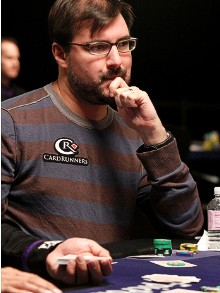As someone who plays professionally, I know a poker game when I see one -- and the current debt ceiling and budget standoff is the biggest poker game going.
The bets may be in the trillions, the chips in play may be Social Security, Medicare and Big Bird, but the strategy and tactics are the same as those I see on the felt.
 |
| Matt Matros has won three World Series of Poker bracelets, and his career tournament winnings exceed $2 million. He finds the poker economy a lot more predictable than the actual one. |
Let's see how the players are doing.
Worst bluff: Speaker John Boehner and the rest of the House Republicans who have threatened not to raise the debt ceiling without major concessions from the Democrats.
It's possible to bluff in poker only because our opponents don't know what cards we're holding. But in this case, the Republicans' hand is face-up -- there is no choice but to raise the debt ceiling.
If the government is allowed to run out of money, lawmakers would face nasty choices about spending cuts hitting Social Security, law enforcement and veterans. The public outcry would be enormous, and the Republicans would be forced to muck their hand, raising the debt ceiling after all.
The GOP seems to have figured out that their bluff didn't make any sense, and are now offering a 3-month extension of the debt ceiling. It's a savvy play. When a bluff isn't credible, it's far better to shut down the aggression than to continue throwing good money after bad.
Most adept at the "float": Mitch McConnell, the top Republican in the Senate. When a card player calls a bet without a strong hand, we call that floating. I love to float because it offers me a chance to accumulate more information before committing to a large bluff. On New Year's Eve, McConnell struck a deal to avoid the fiscal cliff that seemed like a big win for Obama, with tax hikes on the rich and no spending cuts.
But the hand is far from over. By prolonging the debate on spending cuts into 2013, Republicans can now take time to gauge public reaction before solidifying their stance. Floating at its finest.
Related: Debt ceiling FAQs - what you need to know
Best railbird: Federal Reserve Chairman Ben Bernanke. Railbirds don't participate in poker games, but they comment and kibitz as if they did. Bernanke recently said the debt ceiling had only "symbolic value" and advocated getting rid of it altogether. It's a powerful idea. The problem is, Bernanke isn't in the game. Railbirds are mere spectators, but that doesn't stop many of them from telling the actual players how they're supposed to play.
The Fed Chairman would fit in perfectly at this summer's World Series of Poker, standing off to the sidelines, whispering to his buddies how he never would've lost all his chips the way Phil Ivey just lost his.
Biggest welcher: Anyone who doesn't want to raise the debt ceiling. Welchers don't pay what they owe, and thus they're the gambling community's lowest life form. Not raising the debt ceiling is equivalent to reneging on a bet. Money has already been promised to seniors, to soldiers, and to Americans who showed enough faith in the government to buy their bonds, but if the debt ceiling isn't raised, someone is going to get stiffed.
In poker, there's an easy way to combat a reckless opponent -- you wait until you have a strong hand, and then take all of his chips. But that doesn't work with someone who makes a bet and then decides not to put any money in the pot after they've been called. Welchers are hated not just by their creditors but by all poker players worldwide, because they ruin the game for everyone.
Biggest nit: Tie, Boehner and President Obama. A nit is a risk-averse, overly cautious player routinely mocked by his peers. They wait patiently for an unbeatable hand, willing to fold for hours rather than risk busting. But nits never win tournaments. By the time nits are willing to commit their chips, it's too late in the game for them to make a meaningful difference. Sound familiar? Politicians are avoiding wholesale solutions, preferring to remain safe within their party lines.
There is actually one big difference between a real poker game and the budget showdown. In the case of the economy, there's a way everybody can win! But that solution would require risky compromise on tax increases and spending cuts. Poker professionals will sometimes pass up short-term profits if they think there's an opportunity for a larger gain in the long run. Do the nits have what it takes to make such a bold play?
The opinions expressed in this commentary are solely those of Matt Matros, a professional poker player and writer living in Brooklyn, N.Y.


